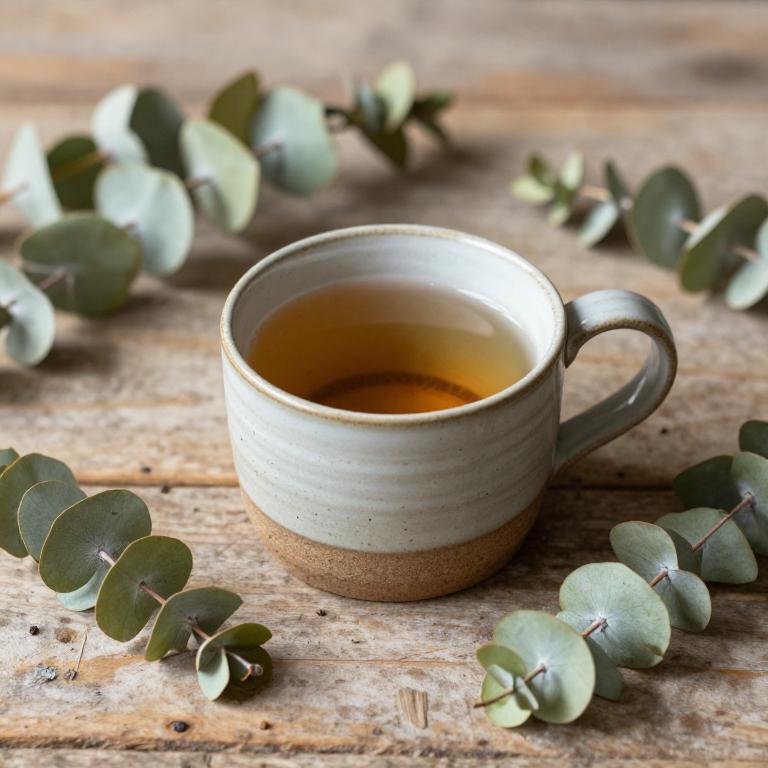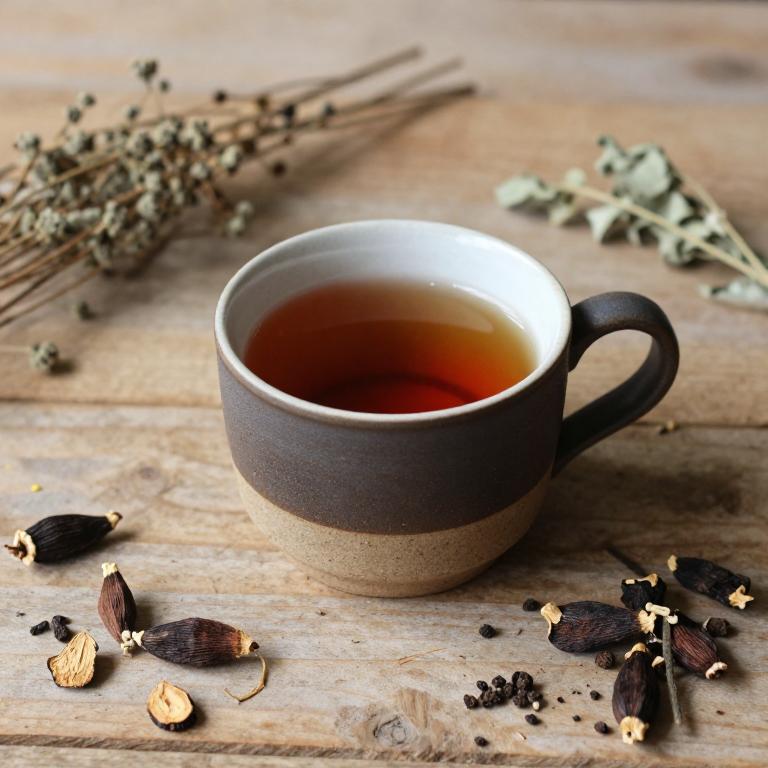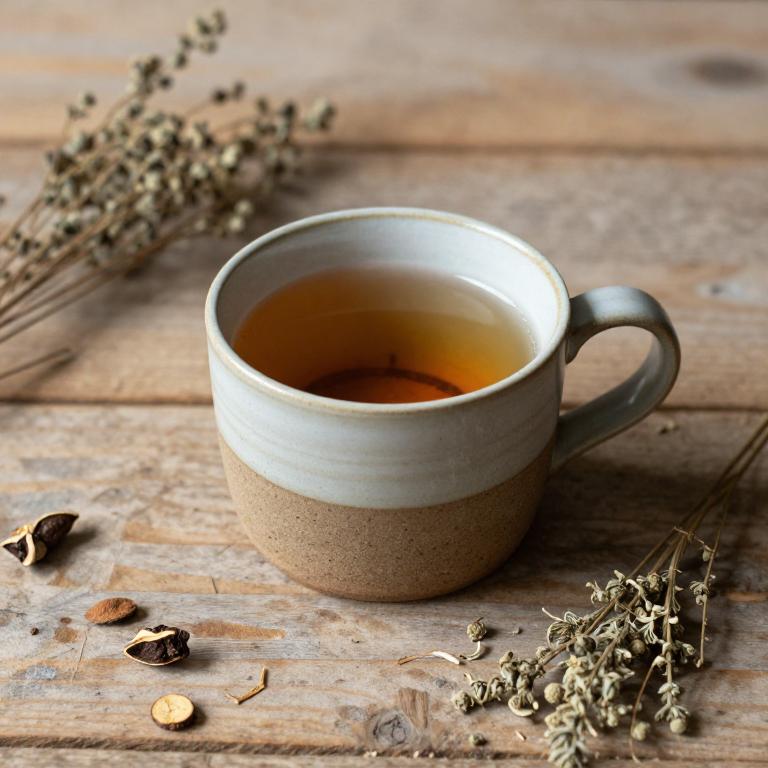10 Best Herbal Teas For Asthma

Herbal teas have been traditionally used to support respiratory health and may offer some relief for individuals with asthma.
Certain herbs like licorice root, ginger, and eucalyptus are believed to help reduce inflammation and ease breathing by acting as natural bronchodilators. While herbal teas are generally considered safe, they should not replace prescribed asthma medications and should be used as a complementary therapy under the guidance of a healthcare professional. Some studies suggest that specific herbal formulations may help alleviate symptoms, though more research is needed to confirm their effectiveness.
It is important to consult with a doctor before incorporating any herbal tea into an asthma management plan to ensure it is safe and appropriate for individual health conditions.
Table of Contents
- 1. Peppermint (Mentha piperita)
- 2. Stinging nettle (Urtica dioica)
- 3. Eucalyptus (Eucalyptus globulus)
- 4. Salvia (Salvia officinalis)
- 5. Camellia (Camellia sinensis)
- 6. Thyme (Thymus vulgaris)
- 7. Licorice (Glycyrrhiza glabra)
- 8. Black pepper (Piper nigrum)
- 9. Rosemary (Rosmarinus officinalis)
- 10. Ceylon cinnamon (Cinnamomum verum)
1. Peppermint (Mentha piperita)

Mentha piperita, commonly known as peppermint, is often used in herbal teas to support respiratory health, including for individuals with asthma.
The essential oils in peppermint, particularly menthol, can help relax bronchial muscles and ease breathing by reducing airway inflammation. Peppermint tea is believed to act as a natural decongestant, potentially alleviating symptoms such as coughing and mucus buildup. While it is generally considered safe for most people, individuals with asthma should consult a healthcare provider before incorporating it into their regimen, as it may interact with certain medications or exacerbate symptoms in some cases.
Overall, peppermint herbal tea may serve as a complementary therapy to support asthma management when used under professional guidance.
2. Stinging nettle (Urtica dioica)

Urtica dioica, commonly known as stinging nettle, has been traditionally used in herbal medicine for its potential respiratory benefits, including alleviating symptoms of asthma.
When prepared as a herbal tea, stinging nettle is believed to help reduce inflammation in the airways and ease breathing difficulties associated with asthma. The plant contains bioactive compounds such as flavonoids and polyphenols, which may contribute to its anti-inflammatory and bronchodilating effects. While some studies suggest that nettle tea may support respiratory health, it is important to consult a healthcare provider before using it as a complementary therapy for asthma.
As with any herbal remedy, individual responses can vary, and it should not replace prescribed medical treatments for asthma.
3. Eucalyptus (Eucalyptus globulus)

Eucalyptus globulus, commonly known as the Australian blue gum, is often used in herbal teas to support respiratory health, including in the management of asthma.
The tea is derived from the leaves of the eucalyptus tree and contains compounds like eucalyptol, which have mild anti-inflammatory and decongestant properties. These properties may help to ease breathing by reducing mucus buildup and soothing airway irritation. While it is not a substitute for conventional asthma treatments, some individuals find it beneficial as a complementary remedy.
However, it is important to consult a healthcare provider before using eucalyptus globulus tea, especially for those with severe asthma or who are taking other medications.
4. Salvia (Salvia officinalis)

Salvia officinalis, commonly known as sage, has been traditionally used in herbal medicine for its potential respiratory benefits.
While scientific evidence on its direct effect on asthma is limited, some studies suggest that sage may help reduce inflammation and mucus production, which are common in asthma patients. Sage tea is often prepared by steeping dried leaves in hot water, and it is believed to soothe the throat and ease breathing. However, it is important to consult a healthcare provider before using sage tea as a complementary treatment for asthma, as it may interact with medications or exacerbate symptoms in some individuals.
Overall, sage herbal tea may offer mild relief for respiratory discomfort but should not replace prescribed asthma treatments.
5. Camellia (Camellia sinensis)

Camellia sinensis, the plant from which green and black teas are derived, contains bioactive compounds such as polyphenols and catechins that may have anti-inflammatory and bronchodilatory effects.
Some studies suggest that these compounds could help reduce airway inflammation and improve lung function, potentially offering supportive benefits for individuals with asthma. However, while herbal teas made from Camellia sinensis are generally considered safe, they should not replace prescribed asthma medications. It is important to consult a healthcare provider before incorporating any herbal tea into an asthma management plan.
Overall, Camellia sinensis herbal teas may complement traditional treatments but require careful use and monitoring.
6. Thyme (Thymus vulgaris)

Thymus vulgaris, commonly known as thyme, is a popular herb used in herbal teas for its potential respiratory benefits, including its use in managing asthma symptoms.
The essential oils in thyme, particularly thymol, possess anti-inflammatory and bronchodilatory properties that may help reduce airway inflammation and ease breathing in individuals with asthma. While thyme tea is not a substitute for prescribed asthma medications, some studies suggest it may complement conventional treatments by improving lung function and reducing mucus production. However, it is important to consult a healthcare provider before using thyme or any herbal remedy, as it may interact with certain medications or exacerbate symptoms in some cases.
Overall, thyme herbal tea can be a soothing addition to an asthma management plan when used under professional guidance.
7. Licorice (Glycyrrhiza glabra)

Glycyrrhiza glabra, commonly known as licorice root, has been traditionally used in herbal teas for its potential respiratory benefits, including alleviating symptoms of asthma.
The active compounds in licorice root, such as glycyrrhizin and flavonoids, may help reduce inflammation in the airways and ease bronchial spasms, which are common in asthma attacks. When consumed as a herbal tea, licorice root can soothe the throat and reduce coughing, providing some relief for individuals experiencing asthma-related respiratory discomfort. However, it is important to note that licorice root should be used with caution, as excessive consumption may lead to side effects such as increased blood pressure and electrolyte imbalances.
While it may complement conventional asthma treatments, it should not replace prescribed medications without consulting a healthcare professional.
8. Black pepper (Piper nigrum)

Piper nigrum, commonly known as black pepper, is often used in herbal teas for its potential respiratory benefits.
While it is not a primary treatment for asthma, some studies suggest that the active compound piperine may help reduce inflammation and improve bronchial function. Herbal teas made with black pepper can be combined with other herbs like ginger or turmeric to enhance their anti-inflammatory effects. However, it is important to note that these teas should not replace prescribed asthma medications and should be used under the guidance of a healthcare professional.
Overall, piper nigrum herbal teas may offer supportive relief for asthma symptoms when used as part of a holistic approach to respiratory health.
9. Rosemary (Rosmarinus officinalis)

Rosmarinus officinalis, commonly known as rosemary, is a fragrant herb that has been traditionally used for its medicinal properties, including its potential benefits for respiratory health.
Rosemary herbal tea is often recommended as a natural remedy to support individuals with asthma due to its anti-inflammatory and bronchodilating effects. The essential oils in rosemary, such as cineole and camphor, may help reduce airway inflammation and ease breathing difficulties. While it is not a substitute for prescribed asthma medications, rosemary tea can be a complementary therapy to help alleviate mild symptoms and promote overall respiratory wellness.
However, it is important to consult a healthcare provider before using rosemary tea, especially for those with severe asthma or allergies to the herb.
10. Ceylon cinnamon (Cinnamomum verum)

Cinnamomum verum, commonly known as true cinnamon, has been traditionally used in herbal teas for its potential respiratory benefits.
While scientific evidence is limited, some studies suggest that the essential oils in cinnamon may help reduce inflammation and relax airway muscles, which could offer some relief for asthma symptoms. The warming properties of cinnamon tea are believed to soothe the respiratory system and ease breathing in individuals with asthma. However, it is important to note that cinnamon should not replace prescribed asthma medications and should be used as a complementary remedy under medical guidance.
As with any herbal remedy, individual reactions may vary, and it is advisable to consult a healthcare professional before incorporating cinnamon tea into an asthma management plan.